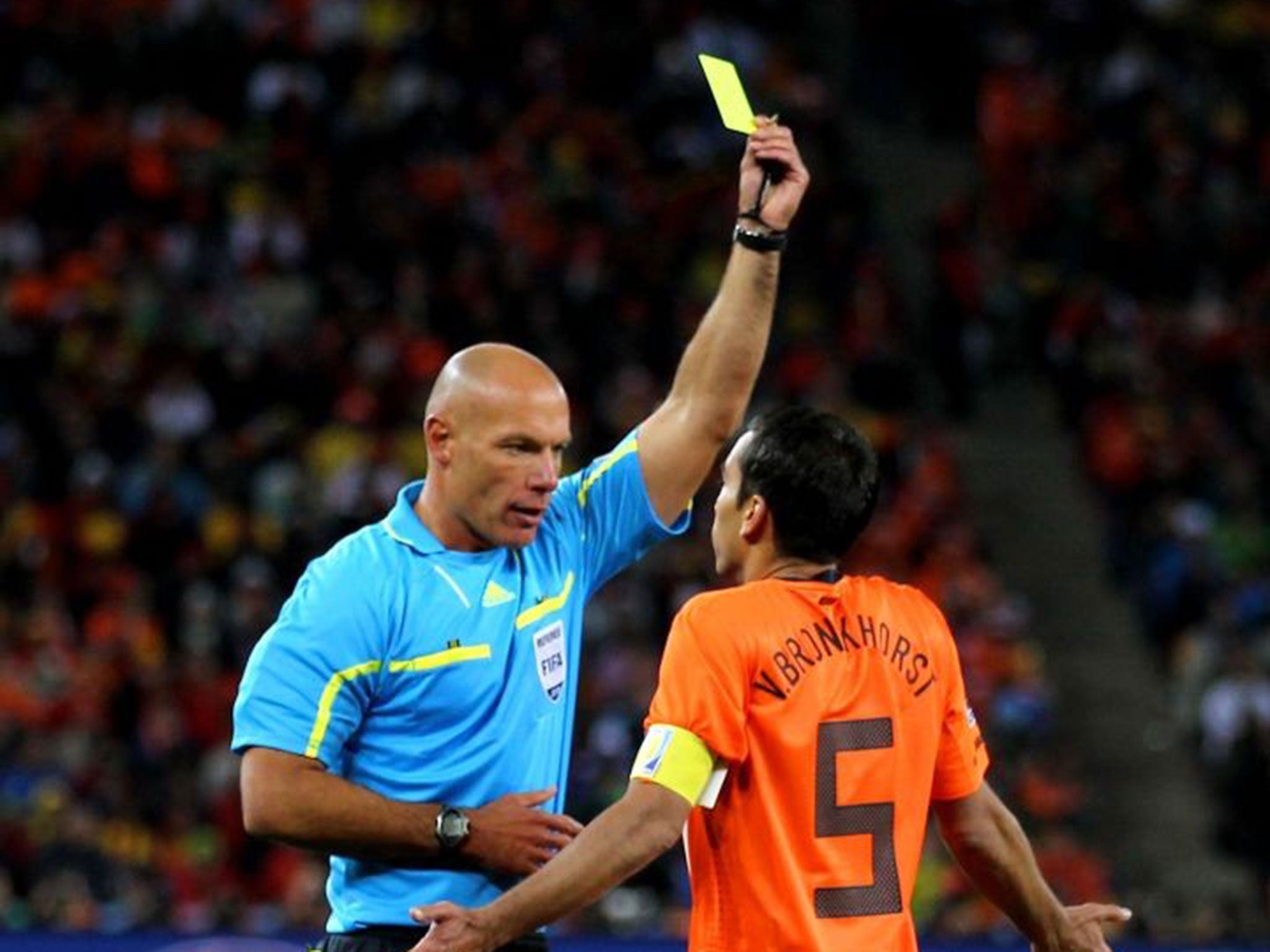Webb departs centre stage as king of whistle-blowers
England’s elite referee ready to educate a new generation of men in the middle

Come Saturday afternoon, for the first season-opening weekend since 2003, Howard Webb will not find himself in the tunnel of a Premier League stadium wondering what kind of game he will encounter out on the pitch.
For Webb, 25 years in refereeing, starting with his very first game at the age of 18 in December 1989 in Orgreave in Yorkshire, are over and he has seen pretty much everything along the way. A World Cup final in Johannesburg, a Champions League final at the Bernabeu, Fabrice Muamba’s collapse at White Hart Lane and enough big-match decisions to fill several careers.
This Saturday, the most high-profile English referee since Jack Taylor, will find himself in a television studio in Salford watching live match feeds and keeping track of his fellow referees’ performances. Webb, in his role as the new technical director of Professional Game Match Officials Limited (PGMOL) will be on the phone to the television networks to explain the rationale behind decisions.
He could still be refereeing, and is young enough, at 43, to go to the European Championship in 2016. Having officiated at his second World Cup finals this summer, Webb decided that it was time to go out at the top. His boss, Mike Riley, PGMOL general manager, described it as the most “unselfish” decision Webb could have made, with the key part of Webb’s new role mentoring the next generation of Premier League referees.
There will be some who will forever accuse Webb of an alleged bias towards Sir Alex Ferguson’s Manchester United, or berate him for failing to send off Nigel de Jong in Soccer City four years ago, when the Dutch player planted his studs into Xabi Alonso’s chest. But most will acknowledge that it has been a remarkable career, in which his highly acclaimed standing in the world’s most lucrative, widely scrutinised sport is global – a rarity, sadly, for English footballers these days.
Coping with the scrutiny has not always been easy. “I think at the very start you look for confirmation of how well you’re doing and you probably look in the wrong places,” Webb said. “You learn quite quickly not to do that. You go to the newsagents and buy the paper that gave you the highest mark!
“You learn quickly that you need to have that self-confidence and learn where to get the valid information from. Everyone’s opinion is valid but you have to make sure it doesn’t affect the way you go about what you do.”
Indeed, part of the training Webb will oversee for Premier League and Football League referees is a mental toughness programme developed by Sheffield Hallam University. While many referees can grasp the technical and physical requirements of the job, it is that ability to make cool decisions in the heat of a game that separates the best from the rest.
For Webb, formerly a sergeant in South Yorkshire police, that part of the job came a little easier. He took a five-year sabbatical from the force in 2008, but since 2013 has returned to do 10 hours a week alongside his refereeing – on community programmes encouraging young people to play football. In the last month he has quit both refereeing and police work, the only two jobs he has known.
As for the United favouritism allegations, Webb says he gives them no consideration because they were baseless. “What does play on my mind is when I’ve made a mistake,” he said, “particularly an influential one that has affected the outcome of a game.
“I’d be dishonest if I said it [a mistake] didn’t bother me. One paper listed the five games I’d want to forget over the course of my career. Well, there’s more than five. Against the backdrop of more than 500 professional games – I can think of many top footballers who have made plenty of mistakes but are still top footballers. If our integrity is questioned by people in a serious way, that’s a different matter. The level of integrity we have as a group is really high.”
He will miss his old team of linesmen, Darren Cann and Mike Mullarkey, who will continue without him this season. “I am stealing [former referee] Pierluigi Collina’s line when he said it can be lonely out there in that stadium for a referee, even though you are surrounded by 70,000 people. But it is not so lonely when you have your mates talking in your ear. After 22 minutes of the [2010] World Cup final, I said to them over the headset, ‘This is not going to plan’ and they said ‘Hey, believe in yourself. Keep going.’”
As for the potential introduction of video technology, as being trialled in the Netherlands this year with managerial appeals for decisions going to a video judge, Webb is wary. He cautions that football does not lend itself to the stoppages that American football accommodates.
“We are keeping an open mind to anything. If we’re not careful it will end up opening more questions than answers. We need to be careful not to change the basis of the way the game is played, the high intensity and fast flow that makes it such a good spectacle.”
Join our commenting forum
Join thought-provoking conversations, follow other Independent readers and see their replies
Comments
Bookmark popover
Removed from bookmarks